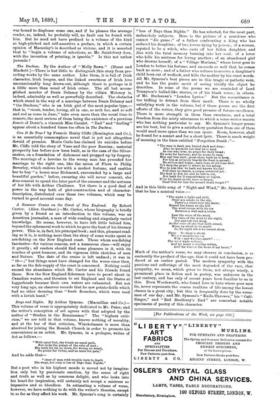Days and Nights. By Arthur Symons. (Macmillan and Co.)— This
volume of verse is appropriately dedicated to Mr. Pater, and the writer's conception of art agrees with that adopted by the author of "Studies in the Renaissance." The "highest criti- cism," we are told in that volume, knows nothing of morality, and at the bar of that criticism, Winckelmann is more than absolved for joining the Romish Church in order to promote his convenience as an artist. Mr. Symons, in a prologue, writes of Art as follows :— "With equal feet, she treads an equal path, Nor reeks the goings of the sons of men ;
She hath for sin no scorn, for wrong no wrath. No praise for virtue, and no tears for pain."
And he adds that-
" since of man with trouble born to death
She sings, her song is less of Days than Nights."
But a poet who in his highest moods is moved not by imagina- tion only but by passionate emotion, by the sense of right and truth as well as by sensuous delight, and who looks into his heart for inspiration, will certainly not accept a mistress so impassive and so bloodless. In estimating a volume of verse, however, we have nothing to do with the writer's theories, except in so far as they affect his work. Mr. Symons's song is certainly
"less of Days than Nights." He has selected, for the most part, melancholy subjects. Here is the picture of a murderer who cannot "die game ;" of a father confronting a King who has seduced his daughter; of two lovers dying by poison ; of a woman, reputed to be a witch, who casts off her fallen daughter, and dies with the fatal memory burning into her soul ; of a lover who kills his mistress for loving another ; of an abandoned girl who drowns herself; of a "Village Mariana," whose lover goes to London to better his fortune, and succeeds so well that he comes back no more ; and of a father who refuses to receive a daughter's child born out of wedlock, and kills the mother by his cruel words. All Mr. Symons's best pieces are in this tragic or pathetic vein, and he has the poetic merit of seeing vividly the object he describes. In some of the poems we are reminded of Lord Tennyson's ballad-like stories, or of his blank verse ; in others, of Mr. Buchanan's "London Lyrics." But the resemblance is too trifling to detract from their merit. There is no wholly satisfying work in the volume, but if these poems are the first efforts of the writer, they give good promise of future excellence. There is more strength in them than sweetness, and a total freedom from the misty utterances to which a verse-writer resorts who has nothing particular to say. Mr. Symons's longer poems are his best, but to give a satisfactory quotation from one of them would need more space than we can spare. Room, however, shall be found for a sonnet and for a short lyric. There is much weight of meaning in the lines entitled "Forgotten Death :"— " The man is dead, yea, buried dark and deep ;
Alas, he Imoweth not that he is dead.
As one who lives, he prays for daily bread; He sows for harvests, and he seems to reap. Men call him lord ; great store bath he in keep. For him at princely boards the fount is spread ; He strives and hopes; hath been of old time wed: Yet deep the grave 14 where he lies asleep.
Woe to him tha.. he hath not known his lot I Self-slain he stands, a corpse unburied yet : His flesh he fed, his soul he left to rot, Nor bath for it remembrance or regret. If he his death-in-life have so forgot, Shall God for him the second death forget ? "
And in this little song of "Night and Wind," Mr. Symons showi that he has a musical voice :— " The night is light and chill, Stars are awake in the sky,
There's a cloud over the moon ; Round the house on the bill The wind creeps with its cry Between a wail and a croon.
hear the voice of the wind, The voice of the wind in the night, Cry and sob end weep. As the voice of one that hath sinned, Moan ng aloud in its might In the night when he cannot sleep.
Sleep ' No sleep is about.
Wit it n membering s:n Wake and watches apart? . . . The wind wails without, And my heart is wailing within, And the wind is the voice of my heart."
Much of the author's verse, we may observe in conclusion, is so eminently the product of the age, that it could not have been pro- duced at an earlier period. The modern sympathy with the passions and sufferings of the most degraded of the race, that sympathy, we mean, which gives to them, not always wisely, a prominent place in fiction and in poetry, was unknown in the last century, and has only of recent years been familiar to us in this. Even Wordsworth, who found love in huts where poor men lie, never represents the coarse realities of life among the lowest classes in a great city; but this is frequently done by the verse- men of our day ; and Mr. Symons's "Knife-Thrower," his "Café- Singer," and "Red Bredbury's End" are somewhat notable specimens of poetry of this character.


































 Previous page
Previous page